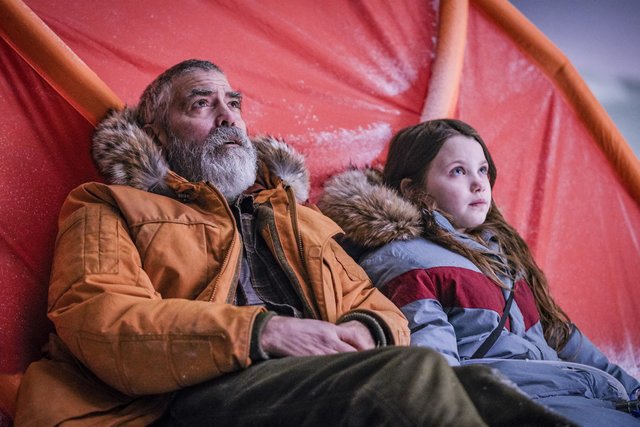Netflix's 'The Midnight Sky' is a science-fiction epic with ominous, apocalyptic undertones
The protagonist has lost his self-regard, and it must be restored — even if radiation poisons the earth, or a plague strikes hundreds of thousands.
By Noah Berlatsky, cultural critic
The new Netflix film “The Midnight Sky” is supposed to be a lyrical, melancholic reflection on the persistence of love and human connection even at the end of the world. It also, though, shows how stories often use the apocalypse for redemption. The world dies so some sympathetic main character can make up for past errors and receive narrative closure. Especially now, while we’re experiencing a certain number of mini-apocalypses, it does make you wonder why some people’s emotional arcs are worth burning the whole planet to the ground.
https://dennisle834.medium.com/%E8%81%96%E8%AA%95%E7%AF%802020-%E8%81%96%E8%AA%95%E8%80%81%E4%BA%BA%E5%B9%BE%E6%99%82%E6%B4%BE%E7%A6%AE%E7%89%A9-%E5%B0%8F%E6%9C%8B%E5%8F%8B%E5%8F%AF%E7%B9%BC%E7%BA%8Ccheck-3c4acccca7df

George Clooney both directs and stars in the movie, based on the novel “Good Morning, Midnight” by Lily Brooks-Dalton. He plays aging, very bearded scientist Augustine Lofthouse, who discovered an inhabitable moon of Jupiter in his youth. Now, however, he is based at an Arctic weather station, where he may be one of the last people alive on earth following some obscure planetwide radiation catastrophe. Augustine is himself dying of cancer, but he discovers that there is a little girl named Iris (Caoilinn Springall) who has been hiding in the weather station with him. Augustine also learns that a spacecraft has left Jupiter’s moon and is returning to Earth; he and Iris travel across the frozen arctic to reach another station with a more powerful transmitter so they can warn the crew, including Sully (Felicity Jones), that Earth is no longer safe.
The movie is a Hollywood science-fiction epic, and inevitably there are adventures, narrow escapes and tragedies. The film is not held together by the action sequences, however, but by daddy issues.
Augustine is haunted by memories of abandoning the love of his life, Jean (Sophie Rundle) and their daughter whom he has never met. The silent Ivy serves as a surrogate for what he’s lost — even more literally than it appears at first, we discover by the end of the movie. Meanwhile, Sully up in space has somewhat unexpectedly become pregnant with a daughter by commander Gordon Adewole (David Oyelowo). And just in case you missed the theme, another astronaut, Sanchez (Demián Bichir), late in the film explains that he sees his colleague Maya (Tiffany Boone) as a surrogate daughter, replacing his own who died very young.
The bleak landscapes of space and of the Arctic aren’t just physical barriers, then; they’re symbols of distance and loss. When Augustine and Iris get separated in the snow as wolves circle, it’s a visual analog of his own internal emotional aridity, and of his regret (“I thought I lost you!” he cries). The film concludes with a series of sentimental reversals, which allow Augustine the chance to make amends and reconcile with his past errors and his grief. The death of almost everyone on Earth is engineered so that Augustine can make up for the neglect and disconnection of his past and restore a domestic family unit which he foolishly neglected.
Related
OPINION
Netflix's 'The Prom' is a glittery, passionate and wildly unsubtle morality play
The closure provided by the apocalypse resolves Augustine’s psychodrama conveniently — almost too conveniently. Is “Midnight Sky” the story of a man at the end of the world, or is it the story of a man experiencing a psychotic break, in which he imagines the world ending as a way to ameliorate his guilt about being a bad father? Similarly, you could see “It’s a Wonderful Life” as a story about how George Bailey (Jimmy Stewart) fantasizes that angels tell him he’s a good guy as he faces financial ruin, or “Die Hard” as John McClane (Bruce Willis) wishing his estranged wife’s company would be the target of a terrorist attack so he could save the day and win her back. There are no shortage of movies in which the universe cracks itself apart to make sure some (usually white) guy gets to feel good about himself, no matter the fallout for everyone else.
Recommended
https://zenodo.org/communities/crazy-primitive-2-2020-hd-chinese/?page=1&size=20
https://zenodo.org/communities/soul-2020-full-version-chinese/?page=1&size=20
https://www.guest-articles.com/business/110-google-24-12-2020
https://www.guest-articles.com/awards/12-24-12-2020
https://hybrid-analysis.com/sample/52546a3878b834076a3d19ccf575c46bc0853076861bb8fff26fb57dc51ed382
https://hybrid-analysis.com/sample/fcb47047b0d9838e81111b5ff292ba45268b8fb2323db84e5a0893fd012c3b8d
https://gumroad.com/kashus23
https://muckrack.com/kenly-kashus
OPINION
Shonda Rhimes reinvented how to present race in a period piece with 'Bridgerton'
OPINION
The 'relief' in Washington's paltry Covid relief bill will be short-lived. Here's why.
This isn’t to say that any of these movies are bad. “Die Hard” and “It’s a Wonderful Life” are classics for a reason, and even “Midnight Sky” has its pleasures. But the narratives feel less warm and fuzzy when you look at who gets sacrificed at the altar of whose inner peace. The close-ups of Clooney — his eyes crinkling with pathos above that giant beard — start to seem almost ominous, like his ego is bearing down upon us.
Related
OPINION
We want to hear what you THINK. Please submit a letter to the editor.
The Sigur Rós-like mix of classical and electronica indicates that we are in the presence of immense emotional landscapes. The protagonist has lost his self-regard, and it must be restored, even if radiation poisons the earth, or a plague strikes hundreds of thousands. "The Midnight Sky" is just a movie, but the way that one person's need to feel good about himself is given more narrative weight than an unfolding apocalypse resonates uncomfortably in our current moment.